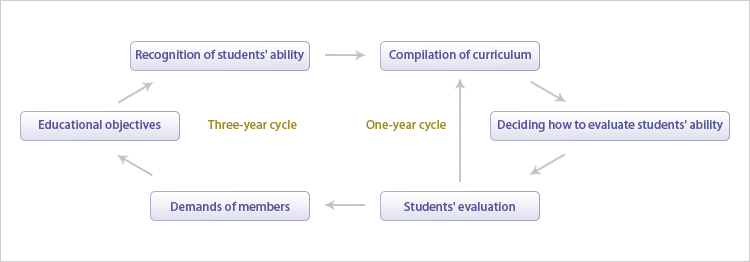The Department of Electronic Engineering has been operating two programs simultaneously, one of which is the Professional Programs for Electronic Engineering, and the other is the General Programs for Electronic Engineering. When a student takes the general program, the student only needs to obtain the credits for the existing bachelor graduation requirements. However, in the case of professional programs, the students shall meet the completion requirements of accreditation education, which have been established separately. In case a student could not meet the completion requirements, the department may put off the student's graduation according to Clause 2, Article 33 of Detailed enforcement regulations of Statutes of Kwangwoon University. And the professional program(Engineering Accreditation Program) of Kwangwoon University is not based on the individual accreditation system, but the program accreditation system(guarantee for meeting the accreditation requirements of all graduates who belong to the program), so that the students who belong to the professional program can graduate only when they meet the completion requirements of accreditation. Accordingly, all the students of Department of Electronics & Communication Engineering must select one of the programs that they want to complete, among general and professional programs, through an interview with academic advisor. However, all the students shall make a final decision after careful consideration right before the start of 1st semester 3rd year(the 5th semester on the basis of entrance).
| Programs |
Curriculum |
Required subjects for Accreditation |
Elective subjects for Accreditation |
| Professional programs for Electronic Engineering |
Specialized Liberal Arts |
18 |
|
| MSC |
30 |
|
| Major classification |
Basics for major |
22 |
9 |
| General major |
12 |
6 |
| In-depth major |
6 |
9 |
| Total |
Major |
More than 64 credits |
| 140 credits in total, including 112 credits from subjects for accreditation |
| General programs for Electronic Engineering |
Students who enter the school before 2003 |
Entering students since 2003r(Students transferred into the 2nd year in 2004,Students transferred into the 3rd year in 2005) |
Entering students since 2010 |
| Liberal Arts |
30 |
Liberal Arts |
30 |
Liberal Arts |
30 |
| Major |
35 |
Major |
45 |
Major |
60 |
| Obtaining 140 credits in total |
